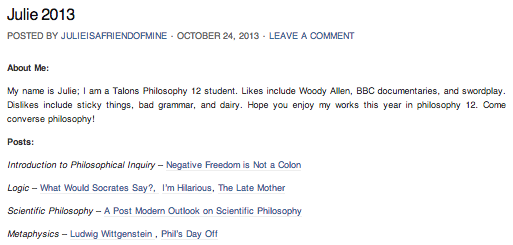Given the way my own learning had unfolded this semester, it’s not surprising, perhaps, that I would be coming to identify (and experiment) with the idea of emergence in my classrooms and the extra-curricular projects I’ve undertaken. My goals of a month ago talked about my intentions:
“to create […] space to reflect on this year’s learning environments, and gradually engage in a manner that seems most appropriate to my own learning and thinking about teaching, facilitation, and collaboration.”
What might otherwise be seen as a failure to commit to any one thing in particular is something I’ve found aligning with emergent educationists Gert Biesta and Deborah Osberg:
“…if educators wish to encourage the emergence of meaning in the classroom, then the meanings that emerge in classrooms cannot and should not be pre-determined before the ‘event’ of their emergence.”
I’ve been thinking about how this type of emergence arrises in transformative learning on both an individual and a cultural level, and how the skills and behaviours required for this type of ongoing, lifelong learning might also be a requisite societal competency in maintaining a democratic society. Paulo Freire has added to these ideas, as has (again) Gert Biesta, who cites Wilfred Carr and Anthony Hartnett‘s assertion that citizenship education is a process by which
“individuals develop those intellectual dispositions which allow them to reconstruct themselves and their social institutions in ways which are conducive to the realization of their freedom and the reshaping of their society.”
These are a few of the ideas guiding me with the various threads I’ve been exploring in my classrooms and other learning spaces this semester as part of my personal learning project.
Philosophy 12
While it might not qualify as Massive, my ‘open learning’ coursework this semester has found a natural home in critically reflecting on my work teaching and learning in the open with a group of grade eleven and twelve students (and occasionally Stephen Downes) in Philosophy 12. Setting out, my hope was
“that as we move[d] forward, both this semester and into future cycles of the class, we have an organic means of establishing a set of pathways for future exploration of the site, and the philosophical knowledge that is discussed, shared and stored on the site’s various pages and posts.”
But this direction didn’t seem inclusive of the – very real – hybrid nature of the classroom environment; Philosophy 12 has never been composed merely of its online components, but exists fundamentally between the connections of its daily face-to-face participants. In the class’ study of Metaphysics, I was particularly aware of Jesse Stommell’s post on Hybrid Pedagogy:
“When we build a hybrid class, we must consider how we’ll create pathways between the learning that happens in a room and the learning that happens on the web.”
Here, the class’ personal studies went into the wild (with #PhilsDayOff), and returned to the classroom to be shared in a process that was both individually, and collectively, an act of synthesis. All of it was documented and ‘captured’ on the class site (and live on the web as it unfolded).
But this only accomplishes one aspect of the task: to cultivate – alongside the present artifacts of learning – a set of navigable pathways through the layers of annual learning ‘objects’ the course site will continue to house.
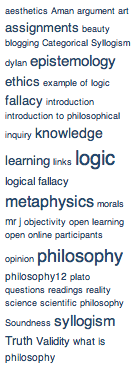 On the Philosophy site, there are already a number of means by which online participants and visitors (as well as for-credit face-to-face students) can locate content relevant and meaningful to their own exploration of philosophy. The Widgets sidebars on the home page have organized content by Recent Comments, Units of Inquiry, and a Tag Cloud of topics, themes and ideas generated over the course’s one full-semester.
On the Philosophy site, there are already a number of means by which online participants and visitors (as well as for-credit face-to-face students) can locate content relevant and meaningful to their own exploration of philosophy. The Widgets sidebars on the home page have organized content by Recent Comments, Units of Inquiry, and a Tag Cloud of topics, themes and ideas generated over the course’s one full-semester.
This year I have looked to integrate ongoing class assignments into the connecting and filtering of course content by assigning for-credit students to act as members one another’s comment groups (so far either randomly drawn or organized by themes of inquiry). These groups are responsible for engaging one another in discussion and dialogue that will further the author’s exploration of the 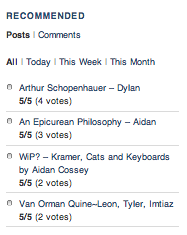 original topic, and help put each assigned post into context with larger class themes and ideas; we have also begun experimenting with a rating system of both posts and comments (corresponding to class-generated criteria) that introduces site visitors to a class-sourced collection of recommended site content.
original topic, and help put each assigned post into context with larger class themes and ideas; we have also begun experimenting with a rating system of both posts and comments (corresponding to class-generated criteria) that introduces site visitors to a class-sourced collection of recommended site content.
Finally, as we approach the course’s mid-term, and a unit on Epistemology, participants are preparing portfolios of their collected work throughout our units and various assigned or unassigned blog posts. While serving as individual records of progress that will allow for ongoing reflection and the synthesis of summative learning assessments, the linked and communally curated portfolios will allow future Philosophy 12 participants (from for-credit to one-time visitor) to navigate the complexities of knowledge archived from year to year.
TALONS.bc.ca
My learning intentions with regards to the fall curriculum in my TALONS classes has shifted somewhat from the heights of maintaining personal cyberinfrastructure to the creation of awareness around Bonnie Stewart’s ideas of “an ethos of participation” in blended online spaces. In adopting a communications approach, Bonnie “focuses on the Internet not as a technology but as a medium for human engagement,” which is an idea I’ve incorporated into a redesigning of the TALONS’ Eminent Person Study this time around.
“Because we hope to be transformed positively from this experience, each of us. But if we are to make these journeys, and come to these new perceptions, there is an almost moral obligation to share that wisdom with others who might make the trip themselves, something I’ll be interested to see unfold in the coming weeks.”
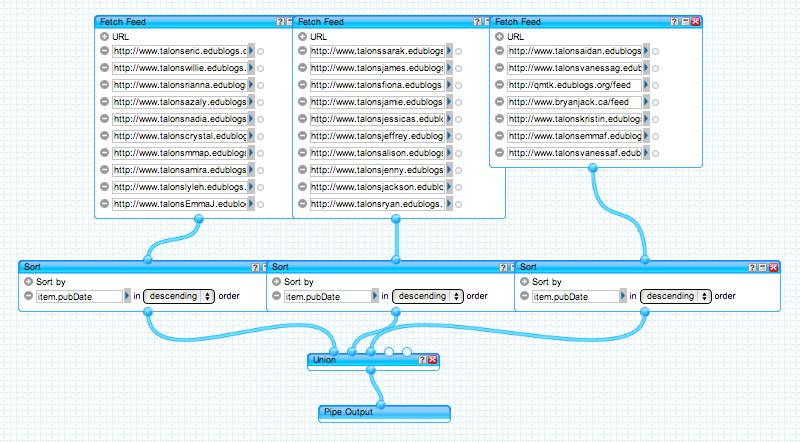 Already, as the Yahoo Pipes have aggregated the class initial explorations of their selected Eminent People, the corresponding RSS feed of blog comments has ballooned with the back and forth discussion of Individual Education Plan goals, notable biographies, and reflections on research adventures in the heart of downtown Vancouver.
Already, as the Yahoo Pipes have aggregated the class initial explorations of their selected Eminent People, the corresponding RSS feed of blog comments has ballooned with the back and forth discussion of Individual Education Plan goals, notable biographies, and reflections on research adventures in the heart of downtown Vancouver.
In the coming weeks, the TALONS will engage in a portfolio cultivation of their Eminent Study not unlike the undertaking in Philosophy 12; in reflection and curation, the present learning will become the pathways for future TALONS learners and collaborators.
The Lunchtime Jam
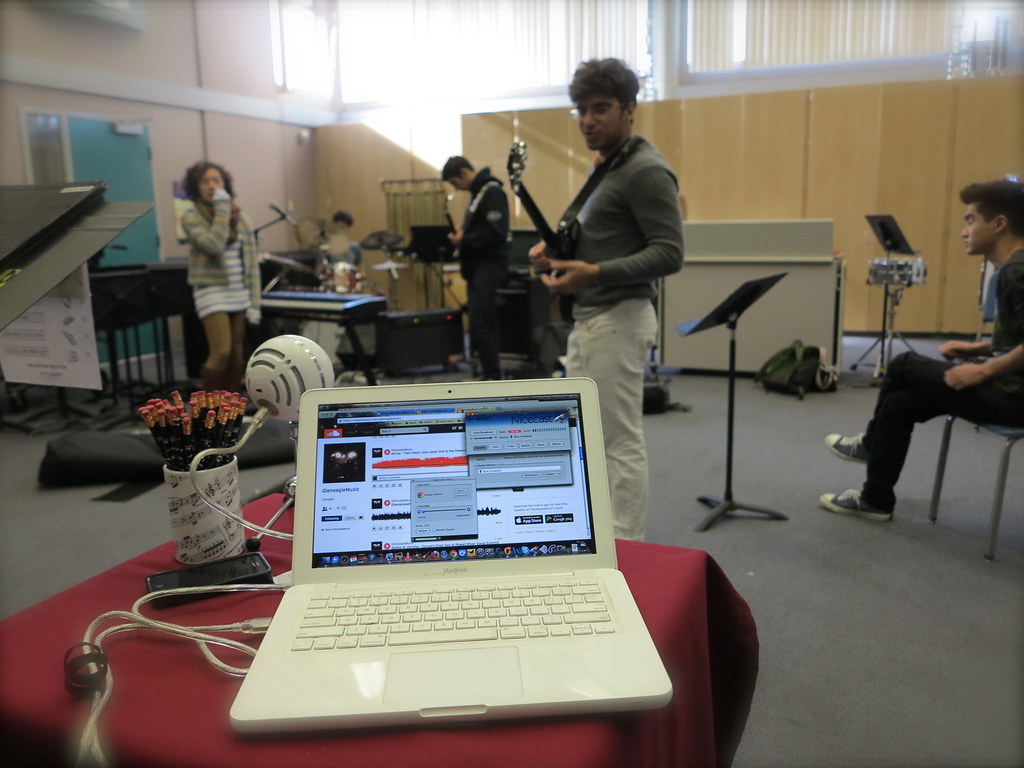
While outside the realm of an ongoing curricular project, I’m no less enthused about the development of Gleneagle Music‘s Lunchtime Jams on K12 distributed web radio station 105 the Hive. Something in Biesta’s citizenship education strikes me as relevant here, where he discusses that
“it can be argued that citizenship learning pervades all aspects of young people’s lives because, in principle, any aspect of their lives can be relevant for their growth as democratic citizens.”
On the other hand, he admits,
“there are very few experiences and events in young people’s lives that are ‘labelled’ as opportunities for citizenship learning.”
So it is that as I’ve watched various players from our school’s musical community stop by the music wing to create some spur-of-the-moment live radio for anyone who wants to tune in, I think of Bonnie Stewart’s “Trojan Horse” for literacies of participation, and how the emergence I’m perhaps most concerned with helping to facilitate and participate in is that of a more participatory democracy.
It is here, I believe, that my various learning projects this semester find common ground in striving to create opportunities for:
“individuals [to] develop those intellectual dispositions which allow them to reconstruct themselves and their social institutions in ways which are conducive to the realization of their freedom and the reshaping of their society.”
In his essay Transformative Learning and Transformative Politics Daniel Schugurensky talks about cultivating societies that
“generate public spaces of social interaction in which discourse is based on finding agreement, welcoming different points of view, identifying the common good in the myriad of competing self-interests, searching for synthesis and consensus, promoting solidarity, and ultimately improving community life.”
This potential creation of public space seems to mirror not only the implicit elements of the Philosophy 12 curriculum, but the aims of the TALONS blogged artifacts, and the shared rhythms of live jazz:


